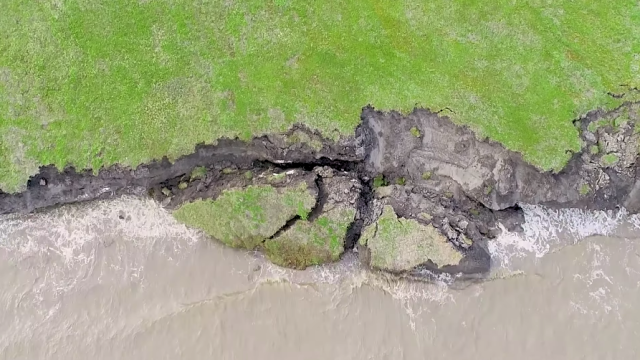As temperatures skyrocket at the top of the world, coastlines are thawing and disintegrating into the ocean. While we think of this as a gradual process, a new drone survey of a portion of Herschel Island in the Canadian Arctic shows just how quickly once-frozen coasts can be erased.
Herschel Island, also known as Qikiqtaruk, is a pretty special place. It spans 45 square miles off the northern coast of the Yukon. Caribou and grizzly bears range across its rolling tundra hills, while ringed seals, belugas, and bowhead whales frolic offshore.
Historical and archaeological sites, including the oldest building in the Yukon, erected by whalers in the 19th century, can be found here. So can the remnants of the much older dwellings of the Inuvialuit people, whose ancestors have used the island for centuries.
Today, Herschel Island is a protected wilderness park that locals venture out to in the summer to connect with a piece of their history.
Now, all that history is existentially threatened. Rising temperatures are warming the Earth and causing the island’s permafrost soils to thaw. At the same time, the sea ice that protects Herschel Island’s shores is breaking up earlier in the spring and freezing later in the fall. Sea levels are rising, too.
The combined effect of all this is that the island is losing land fast: island-wide, its coastlines lost about 0.7 metres of land per year from 2000 to 2011. To get a closer look at that erosion, a team of researchers from the University of Exeter, the University of Edinburgh, and several other institutions conducted a series of seven drone flights over a study area on the southeastern coast. The drone footage showed how the coastline changed from early July to mid-August of 2017.
Lucky for them but unfortunately for the island, the survey happened to capture a huge, sudden loss of land. In just 40 days, the shoreline fell back nearly 15.24m, 10 per cent of how much it had receded over the previous 65 years.
“It was quite a surprise,”Andrew Cunliffe, lead author of the study published last week in The Cryosphere, told Gizmodo.
Cunliffe added that a “combination of interacting factors” seem to be to blame for the land loss, including large storms, warm ocean waters, a lengthening ice-free season, and even the tidal cycle. Additional drone surveys, as well as measurements of the water level and temperature, are now ongoing to learn more about what’s driving the erosion.
Overall, since 1952, the researchers estimate this area has lost an average of 2.2 metres of land per year since 1952, three times the erosion rate of the Yukon coast at large.
These findings are important beyond Herschel Island. For one, they highlight how susceptible thawing permafrost coastlines are to sudden, rapid changes under the right conditions. They also highlight the potential for drones to help suss out those rapid changes, which more traditional satellite or aerial surveys tend to miss.
Cunliffe said his team has gotten some interest from Yukon Heritage Planning, which maintains the island’s historic sites, “into not just our findings but how we got our findings.”
That’s no surprise, given that shoreline loss and flooding have already forced the government to relocate or raise several historic buildings, including a warehouse built by a Canadian whaling company and a hunting cabin. Hopefully, drones can help authorities pinpoint which sites are at risk of being inundated next—and take the actions necessary to save them.
“If you’re part of a local government and you’re interested in how this local coastline is threatened, using tools like this you could collect your own data set, and then an undergraduate might be able to analyse them,” Cunliffe said. “It’s not super complicated or difficult stuff to do.”
